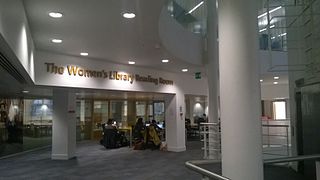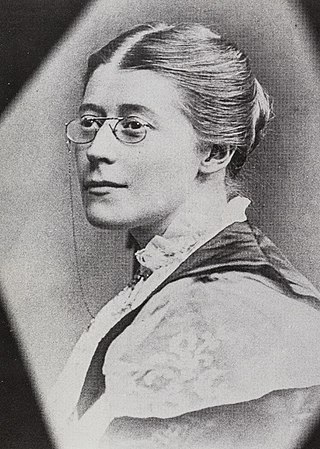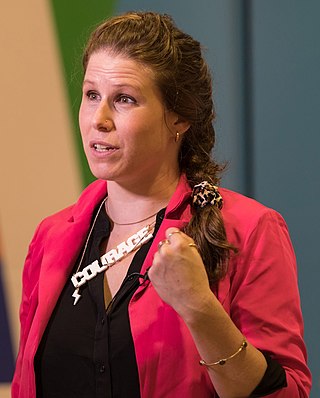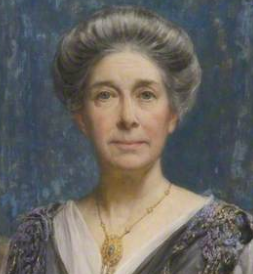
Dame Millicent Garrett Fawcett was an English political activist and writer. She campaigned for women's suffrage by legal change and in 1897–1919 led Britain's largest women's rights association, the National Union of Women's Suffrage Societies (NUWSS), explaining, "I cannot say I became a suffragist. I always was one, from the time I was old enough to think at all about the principles of Representative Government." She tried to broaden women's chances of higher education, as a governor of Bedford College, London and co-founding Newnham College, Cambridge in 1875. In 2018, a century after the Representation of the People Act, she was the first woman honoured by a statue in Parliament Square.

Eleanor Florence Rathbone was an independent British Member of Parliament (MP) and long-term campaigner for family allowance and for women's rights. She was a member of the noted Rathbone family of Liverpool.
In the United Kingdom, as in other countries, feminism seeks to establish political, social, and economic equality for women. The history of feminism in Britain dates to the very beginnings of feminism itself, as many of the earliest feminist writers and activists—such as Mary Wollstonecraft, Barbara Bodichon, and Lydia Becker—were British.

The Representation of the People Act 1928 was an Act of the Parliament of the United Kingdom. This act expanded on the Representation of the People Act 1918 which had given some women the vote in Parliamentary elections for the first time after World War I. It is sometimes referred to as the Fifth Reform Act.

The National Union of Women Suffrage Societies (NUWSS), also known as the suffragists was an organisation founded in 1897 of women's suffrage societies around the United Kingdom. In 1919 it was renamed the National Union of Societies for Equal Citizenship.

The United Procession of Women, or Mud March as it became known, was a peaceful demonstration in London on 9 February 1907 organised by the National Union of Women's Suffrage Societies (NUWSS) in which more than 3,000 women marched from Hyde Park Corner to the Strand in support of women's suffrage. Women from all classes participated in what was the largest public demonstration supporting women's suffrage seen until then. It acquired the name "Mud March" from the day's weather since incessant heavy rain left the marchers drenched and mud-spattered.

The Women's Library is England's main library and museum resource on women and the women's movement, concentrating on Britain in the 19th and 20th centuries. It has an institutional history as a coherent collection dating back to the mid-1920s, although its "core" collection dates from a library established by Ruth Cavendish Bentinck in 1909. Since 2013, the library has been in the custody of the London School of Economics and Political Science (LSE), which manages the collection as part of the British Library of Political and Economic Science in a dedicated area known as the Women's Library.

Dorothy Frances Montefiore, known as Dora Montefiore, was an English-Australian women's suffragist, socialist, poet, and autobiographer.

Esther Roper was an Irish-English suffragist and social justice campaigner who fought for equal employment and voting rights for working-class women.

A movement to fight for women's right to vote in the United Kingdom finally succeeded through acts of Parliament in 1918 and 1928. It became a national movement in the Victorian era. Women were not explicitly banned from voting in Great Britain until the Reform Act 1832 and the Municipal Corporations Act 1835. In 1872 the fight for women's suffrage became a national movement with the formation of the National Society for Women's Suffrage and later the more influential National Union of Women's Suffrage Societies (NUWSS). As well as in England, women's suffrage movements in Wales, Scotland and other parts of the United Kingdom gained momentum. The movements shifted sentiments in favour of woman suffrage by 1906. It was at this point that the militant campaign began with the formation of the Women's Social and Political Union (WSPU).

The International Alliance of Women is an international non-governmental organization that works to promote women's rights and gender equality. It was historically the main international organization that campaigned for women's suffrage. IAW stands for an inclusive, intersectional and progressive liberal feminism on the basis of human rights and liberal democracy, and has a liberal internationalist outlook. IAW's principles state that all genders are "born equally free [and are] equally entitled to the free exercise of their individual rights and liberty," that "women's rights are human rights" and that "human rights are universal, indivisible and interrelated." In 1904 the Alliance adopted gold as its color, the color associated with the women's suffrage movement in the United States since 1867 and the oldest symbol of women's rights; through the Alliance's influence gold and white became the principal colors of the mainstream international women's suffrage movement.

Margaret Theresa Prosser, Baroness Prosser, is a Labour life peer and former trade unionist.

Ray Strachey was a British feminist politician, artist and writer.

Caroline Emma Criado Perez is a British feminist author, journalist and activist. Her first national campaign, the Women's Room project, aimed to increase the presence of female experts in the media. She opposed the removal of the only woman from British banknotes, leading to the Bank of England's swift announcement that the image of Jane Austen would appear on the £10 note by 2017. That campaign led to sustained harassment on the social networking website Twitter of Criado Perez and other women; as a result, Twitter announced plans to improve its complaint procedures. Her most recent campaign was for a sculpture of a woman in Parliament Square; the statue of Millicent Fawcett was unveiled in April 2018, as part of the centenary celebrations of the winning of women's suffrage in the United Kingdom. Her 2019 book Invisible Women: Exposing Data Bias in a World Designed for Men was a Sunday Times bestseller.
Gender inequality is any situation in which people are not treated equally on the basis of gender. In the United Kingdom, the genders are unequally impacted by economic policies, face different levels of media attention, and face inequality in education and employment, which includes a persistent national gender pay gap. Furthermore, according to numerous sources, there exists a pervasive lad culture which has decreased the ability of women to participate in different parts of society.

Priscilla Bright McLaren was an English activist who served and linked the anti-slavery movement with the women's suffrage movement in the nineteenth century. She was a member of the Edinburgh Ladies' Emancipation Society and, after serving on the committee, became the president of the Edinburgh Women's Suffrage Society.

Catherine Osler or Catherine Courtauld Osler; Catherine Courtauld Taylor was a British social reformer and suffragist.

Annot Robinson, nicknamed Annie, was a Scottish suffragette and pacifist. She was sentenced to six months for trying to break in to the House of Commons. She helped to found the Women’s International League for Peace and Freedom.

The statue of Millicent Fawcett in Parliament Square, London, honours the British suffragist leader and social campaigner Dame Millicent Fawcett. It was made in 2018 by Gillian Wearing. Following a campaign and petition by the activist Caroline Criado Perez, the statue's creation was endorsed by both the Prime Minister of the United Kingdom, Theresa May, and the Mayor of London, Sadiq Khan. The statue, Parliament Square's first monument to a woman and also its first sculpture by a woman, was funded through the government's Centenary Fund, which marks 100 years since some women won the right to vote. The memorial was unveiled on 24 April 2018.

The Wages of Men and Women: Should They be Equal? is a book written by English sociologist, economist, socialist and social reformer Beatrice Webb. It deals with equal pay for equal work and the basic principles that should apply to men's and women's wages. First published by the Fabian Society in 1919, the book is a minority report in which Webb criticizes the main purpose and findings of the War Cabinet Committee on Women in Industry. Webb was herself a member of the Committee, which was to investigate whether women who worked in occupations that had been considered men's work before the war were in fact receiving equal pay, and also to establish the principles that would determine the relationship between men's and women's wages.


















